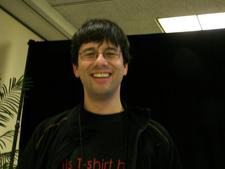USENIX LISA: When 1000 Computers are too Slow
Open source developer Tobias Oetiker, in his presentation at the USENIX LISA conference in San Diego, described how he could help one thousand Windows users at Swisscom.com speed up their computers.
By Oetiker's account, the major assignment he took on was thanks to a prize he had received at the LISA conference two years earlier for his work on two open source projects, MRTG and RRDTool. MRTG stands for Multi Router Traffic Grapher, software that depicts network load based on SNMP traffic through interfaces. The effort got him on the front page of a Swiss newspaper, soon after which Swisscom.com hired him to resolve their computer problems. At the conference he reported on his unusual assignment with the talk "How to Proceed When 1000 Call Agents Tell you, 'My Computer is Slow': Creating a User Experience Monitoring System."
The reproducibility factor was the first of Oetiker's challenges: users would complain of slow systems, but had trouble reproducing the conditions or symptoms. Oetiker's IT experts attacked this from two sides. First, they passively monitored the systems by using CPV Monitor, a software especially created for this project. Secondly, users themselves could voluntarily use CPV reporter for active monitoring and send error notifications directly to the IT team. Despite CPV not exactly being free software, the benefit for Oetiker was that it used many open source packages and was written in perl.
These two solutions had a handle on many of the problems, but more kept emerging and the data collected from the 1,429 units daily amounted to more than two million entries and quickly reached a critical mass. Performance on the server suffered considerably, so the technicians decided to select a part of the assembled data, thus reducing it to 12% of its original volume, based on a random selection of units.
After problem solving in this manner became more manageable, yet another challenge confronted the team: causal research into Windows behavior and responses. Oetiker provided a number of anecdotes. To the joy of talk participants, he commented on Windows Explorer's reaction to a non-responding application: "The Not Responding message is more or less for your entertainment" and has nothing to do with what's actually happening on the computer. Oetiker's conclusion, based on a participant’s question, was that "For me, Windows continues to remain a complete mystery."
One thing he could take from his project was, "From the moment users sent in their problems via CPV Reporter, they subjectively had the feeling things were getting better, even though we hadn't even begun working on a solution. They in fact were part of the solution."
Subscribe to our Linux Newsletters
Find Linux and Open Source Jobs
Subscribe to our ADMIN Newsletters
Support Our Work
Linux Magazine content is made possible with support from readers like you. Please consider contributing when you’ve found an article to be beneficial.

News
-
Kernel 7.0 Now in Testing
Linus Torvalds has announced the first Release Candidate (RC) for the 7.x kernel is available for those who want to test it.
-
Introducing matrixOS, an Immutable Gentoo-Based Linux Distro
It was only a matter of time before a developer decided one of the most challenging Linux distributions needed to be immutable.
-
Chaos Comes to KDE in KaOS
KaOS devs are making a major change to the distribution, and it all comes down to one system.
-
New Linux Botnet Discovered
The SSHStalker botnet uses IRC C2 to control systems via legacy Linux kernel exploits.
-
The Next Linux Kernel Turns 7.0
Linus Torvalds has announced that after Linux kernel 6.19, we'll finally reach the 7.0 iteration stage.
-
Linux From Scratch Drops SysVinit Support
LFS will no longer support SysVinit.
-
LibreOffice 26.2 Now Available
With new features, improvements, and bug fixes, LibreOffice 26.2 delivers a modern, polished office suite without compromise.
-
Linux Kernel Project Releases Project Continuity Document
What happens to Linux when there's no Linus? It's a question many of us have asked over the years, and it seems it's also on the minds of the Linux kernel project.
-
Mecha Systems Introduces Linux Handheld
Mecha Systems has revealed its Mecha Comet, a new handheld computer powered by – you guessed it – Linux.
-
MX Linux 25.1 Features Dual Init System ISO
The latest release of MX Linux caters to lovers of two different init systems and even offers instructions on how to transition.

